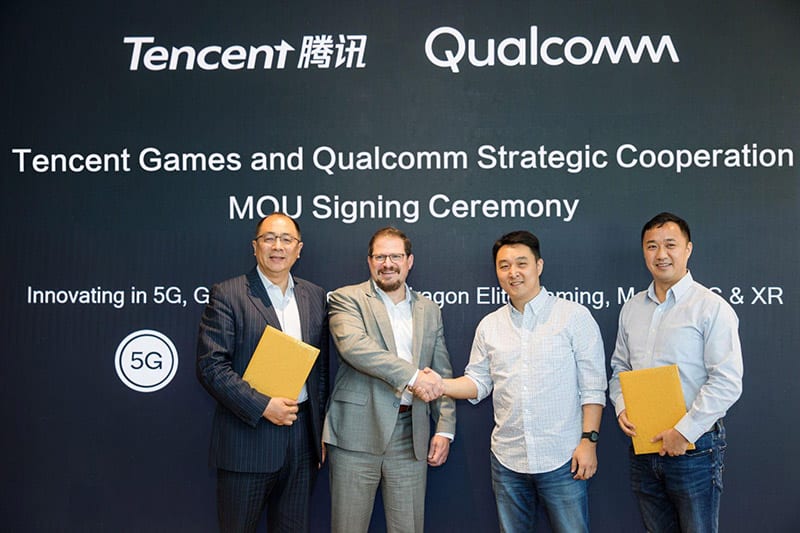
Pictured (left to right): Frank Meng, chairman Qualcomm China, Cristiano Amon, president Qualcomm Technologies, Steven Ma, SVP Tencent, Daniel Wu, GM of Innovation Lab Tencent. Photo Credit: TENCENT GAMES
Chinese tech giant Tencent pushes back against the HMOV alliance with their new collaboration with Qualcomm, the largest supplier of mobile phone chips for Android devices.
Tencent Holdings Ltd (0700.HK) and Qualcomm Inc (QCOM.O) have announced that they will be working together to innovate the games industry in China, with collaborations on projects including smartphones using the Qualcomm’s Snapdragon chips, cloud gaming and the development of a Tencent 5G gaming device.
This follows from their previous collaboration in June, when they teamed up with Republic of Games, the gaming device division of Asustek Computer Inc (2357.TW), to create a gaming phone using a Qualcomm chip.

The Tencent / Asus ROG Phone II, powered by theQualcom
Snapdragon 855 Plus chip has achieved over 2 million pre-orders in China. Photo Credit: ASUS
Why is this important?
Tencent is the largest mobile software company in China, with a market capitalization of about $453 billion. Particularly dominant in China’s Android market, in addition to being a mobile game publisher and having a major presence in social media (WeChat, Tencent Weibo), they also own the most popular Chinese App store – Tencent MyApp.
After negotiating their way through the new games licencing regulations set by the State Administration of Radio, Film and Television (SARFT), their new title Game for Peace (a reworking of their massively successful PUBG title) quickly became the top-grossing game in Apple’s China App Store.
However, the Tencent MyApp store has recently been losing ground due to an alliance of the biggest Chinese device manufacturers (Huawei, Xiaomi, OPPO and Vivio). This HMOV alliance has started pushing subscribers towards their own pre-installed app stores, creating “security issues” around apps downloaded from independents like Tencent MyApp, 360 Mobile Assistant and the Ali App platform, thus making it harder for them to keep their place in the market.
The changing face of gaming in China
With the new collaboration with Qualcomm, Tencent is keeping ahead of the game, entering the device manufacturing arena with a unique Tencent twist, playing to their strengths as a leading app publisher in China.
The Chinese mobile games market is enormous, with a domestic revenue of $15.63 billion in 2018. This is forecast to rise to $25.49 billion within five years. (China Mobile Games Report, May 2019.)
The potential only rises with the arrival of 5G. Huge investment by the government is set to push China ahead to the front of the race to be a world leader in 5G coverage, with an expected 460 million 5G connections by the end of 2025. Increased bandwidth, low latency and speeds up to 20 times faster than other networks will boost the real-time, multi-player and immersive gaming experience.
In this new world, Tencent is poised to make gains on many levels. As both a publisher of top tier games and a distribution channel owner, they have the advantage of being able to set an earlier release date on their own MyApp store, thus enticing users away from device manufacturer stores, where the games wouldn’t be available until later. Designing a smartphone that is really a device focused on game performance to show off their super-glossy and beautiful games gives an added incentive for gamers to move to a Tencent phone when doing their 5G upgrade.
In a world where content is king, it looks like Tencent have made a very smart move.
More news, views and oddities:
A five-story “building” was spotted cruising along the Yangtze River…
